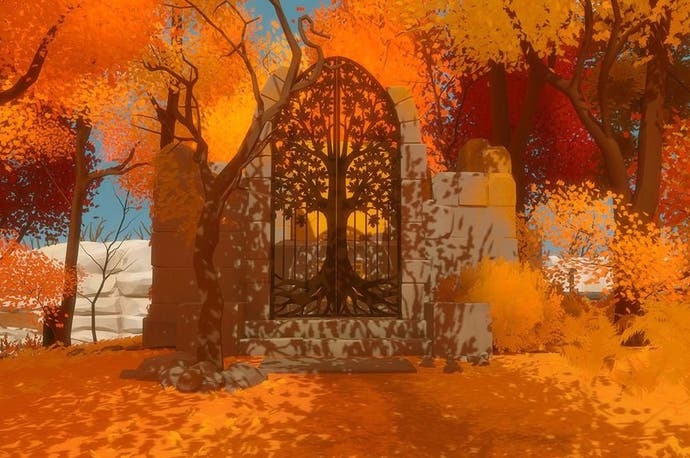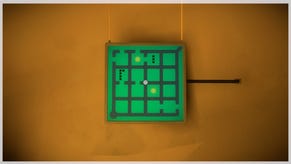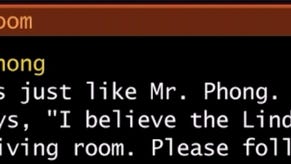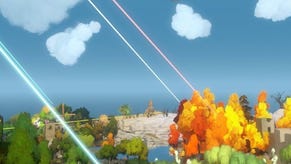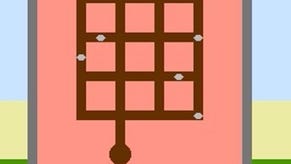Nobody is sure what The Witness is about
How Jonathan Blow makes us feel simultaneously smart and stupid.
Last week I reached the ending of Jonathan Blow's latest opus, The Witness, without the aid of any outside help. For a split second, I felt like the smartest man on the planet. Then, upon watching the ending, I quickly felt like the dumbest as I had no earthly idea what the game I'd just spent a couple dozen of hours on was about.
I'm in good company, however, as it turns out that nobody knows what The Witness is about. No matter how many puzzles they solve, secrets they scour, and information they gather online, the true meaning of The Witness is forever outside of our grasp in a way that makes it as easy to hate as it is to love.
Here's the part where I get into major spoilers, so if you haven't reached the secret ending of The Witness you may want to turn back now.
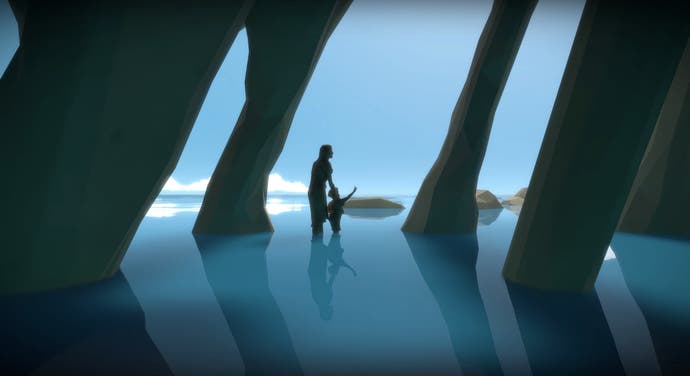
Still with me? Okay. So on a surface level, the hidden ending of The Witness suggests that the island setting is really a virtual space that one inhabits. The game's secret denouement concludes with a live-action film portrayed from a first-person perspective in which a man (possibly Jonathan Blow himself) awakens from a couch in a game development studio wherein The Witness is being made. He unplugs wires connecting his veins to a laptop, while a bottle of urine lies connected to a catheter near the foot of the sofa. The man exhibits an array of strange behaviour. He takes a bite of a cracker, tosses it aside, then starts eating a new one. He smacks a spoon against various surfaces for no apparent reason before discarding the utensil. He locks and unlocks a door several times before crawling outside and taking a nap.
What's going on here? Redditer plainclothesman suggests that the man has obsessive compulsive disorder and that the island is a manifestation of his thought process. Here's an excerpt of their interpretation:
"I was watching someone with obsessive compulsive disorder. This is when I realised why The Witness wouldn't let me go. Touching, checking, repeating, symmetry, tracing lines, separation, pairs, evenness. This was a game that seemed manufactured to appeal to my haywire sense of action and relief. Repetition and reward.
"Obsessive compulsive disorder is a condition of specific rules and repetition. Sometimes it feels like a game. An anxiety riddled, circular, frustrating game. A game that is hard to get 'right'. The Witness is a game that feels like obsessive compulsive disorder."
This analogy holds true as the player begins solving line puzzles, only to later discover hidden lines in the environments. These perspective-hunting secrets are so pervasive that you'll probably start seeing their imagery everywhere outside of the game. They've even inspired a comical Tumblr entitled The Witness Puzzles in Real Life. Indeed, the hidden FMV ending contains similar imagery in the "real world", further blending the line between one's focus on panel puzzles and their reality around them. Getting stuck on a puzzle, then seeing fragmented manifestations from that puzzle in everything, isn't dissimilar to having OCD where it's like trying to shake one's troubles with a brain that refuses to do so.
And yet, this only takes into account a tiny portion of The Witness' more conventional narrative beats. What about the statues of people? What about the various USB sticks you find lying around with quotes by famous philosophers, scientists and artists? What about the underground movie theater in which James Burke waxes philosophical or game developer Brian Moriarty recites his 58-minute GDC presentation about a Easter eggs, numerology, cryptology, music and Shakespear?
Redditer YannFromFrance offers a complex hypothesis about the game's four voice actors, suggesting that each voice is a different person who created a part of the island through their own philosophies. The two men are manifestations of Materialist and Thiest ideologies, while the female voices represent Buddhist and Zen beliefs.
As such, there's some debate as to whether the player actually is one of these people (frequently dubbed "the Pioneers" infan theories). Perhaps they are a manifestation of all humanity summed up into one? Is the player simply a witness to their beliefs?
One interpretation is that the Island is a manifestation of the visitor's mind. "Instead of it being a game or a world, you are actually seeing a visual representation of your 'mind,'" hypothesised Redditer CockGobblin. "Each puzzle is a part of you that you are unlocking. Each area is a part of you in some spiritual / non-physical representation. Each audio log is excepts you've heard in your life that meant something to you. The mountain is your inner self or your 'soul' (i.e. an unidentifiable object)."
It's an interesting read that explains why all of the dialogue and media emanates from the real world. If you're indeed playing as Blow, then a representation of his consciousness would contain quotes and excerpts from films that resonated with him.
Of course this may be too simple a read, as everything in any game is a manifestation of what the developer feels strongly about, but The Witness is particularly meta in its references to the world being constructed. Reditter errorjustin observed that even though The Witness is set in a virtual world, there are references to more concrete constructions everywhere.
"Why make a fictional VR environment that deliberately goes out of its way to look like fake a theme park, when that's more work than just making it look real? It's more challenging to make a tree look fake and painted green than to just make the tree green," errorjustin noted. Is there a literal reason behind these suggestions that the island is constructed, or is it symbolic?
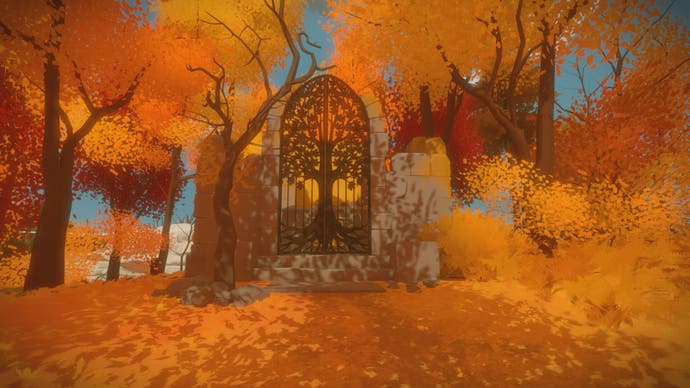
One read is that The Witness' island is symbolic of being inside one's own head too much. "In some spiritual teachings, you learn not to get attached to your spiritual experiences/mind as you'll lose connection with your physical self/world," CockGobblin noted. "This can be represented today as people who play games to live in a fantasy world to escape the real world. In these teachings, you are often taught to keep yourself centered / anchored with a mantra or a focus point to avoid 'wandering off', and when you catch yourself wandering, you bring yourself back instead of following the vision/experience."
"The game is a representation of losing touch with the physical world by getting 'Lost' (haha, it's a pun!) in your mind/brain. And at the same time, you are playing it and getting lost in a fantasy world and while playing you lose touch with your surroundings/time/awareness."
In other words, there's a lot of value in deep contemplation and removal from our physical reality, be it through meditation or playing video games, but digging too deep down these rabbit holes can ultimately prove harmful as the player character is struggling with their motor skills after a prolonged stay on the island. In fact, Brian Moriarty's hidden GDC presentation discusses a man he once knew who believed Santa Claus was the devil due to what he thought was a numerical code he cracked that translated the letters in St. Nick's name to 666, the number of the beast. I'm also reminded of the man in the documentary Room 237 who, based on a series of seemingly sharp observations, stubbornly concluded that Stanley Kubrick faked the moon landing with the US government and made The Shining as a coded confession to his misdeeds. In short: you can overthink it.
This brings up an important question: How much does concretely knowing what The Witness is "about" actually matter? Blow has said himself that his critics tend to focus too strongly on narrative conventions at the exclusion of thematic game design choices. Here's the developer's thoughts on the the matter from a recent Reddit AMA:
"The real thing that bothered me was not response from players, but from pundits or critics. I felt like they all came from this English-major kind of school of thought and only wanted to talk about the story part of the game as the bit that had meaning, when in fact the game design and other aspects of the presentation are obviously very important.
"I felt like there were a folks proclaiming 'we are the people who are smart and who understand video games, and let us tell you what this game is about!', but those people had a very poor understanding of the game! The thing that really bothered me was that these people, if loud enough, might permanently damage the way the world sees the game... in the first couple of weeks this seemed pretty likely, but as time has gone on, it hasn't come to pass. Not too much anyway."
This is one reason why The Witness is so inscrutable. Its linear narrative elements are buried beneath many layers of subtext that we're only beginning to assemble. All the fundamental pieces that construct a story - such as plot, characters and action - are obfuscated so strongly in The Witness that it's easy to proceed through the entire game without ever knowing that there even is a story. We never see its characters in action, and their recordings are quoting other people rather than themselves. Tracing even the bare bones of The Witness' narrative is arguably a more challenging undertaking than solving its bevy of line puzzles.
These additional layers of obscuration make formulating one's own interpretation of The Witness equal parts wondrous, arduous and humbling. I'm not sure I have than analytical resolve to tackle all its enigmas head on, but I admire it all the same for providing such a steep intellectual gauntlet. Lots of game developers want their players to feel smart, but few want to make them feel dumb.
This has led to some disdain for game, though I don't believe Blow implemented the Witness' mysteries to display his intellectual superiority, but rather to provide an analytical challenge. Just at the player traces a line through grids of complex rulesets, we must guide our interpretation of the game through Blow's labyrinth of interconnected imagery, quotes, and mixed media. It's the final cold, mischievous puzzle in a game full of cold, mischievous puzzles.
Mercifully, you needn't solve every puzzle in The Witness to reach its conclusion. Most of its brain-teasers are simply there for the pleasure of solving them. By the same token, one can appreciate The Witness just for the puzzles they enjoy, the scenery they admire, and the thematic elements that resonate with them. The rest is merely there if you want to delve into it.
